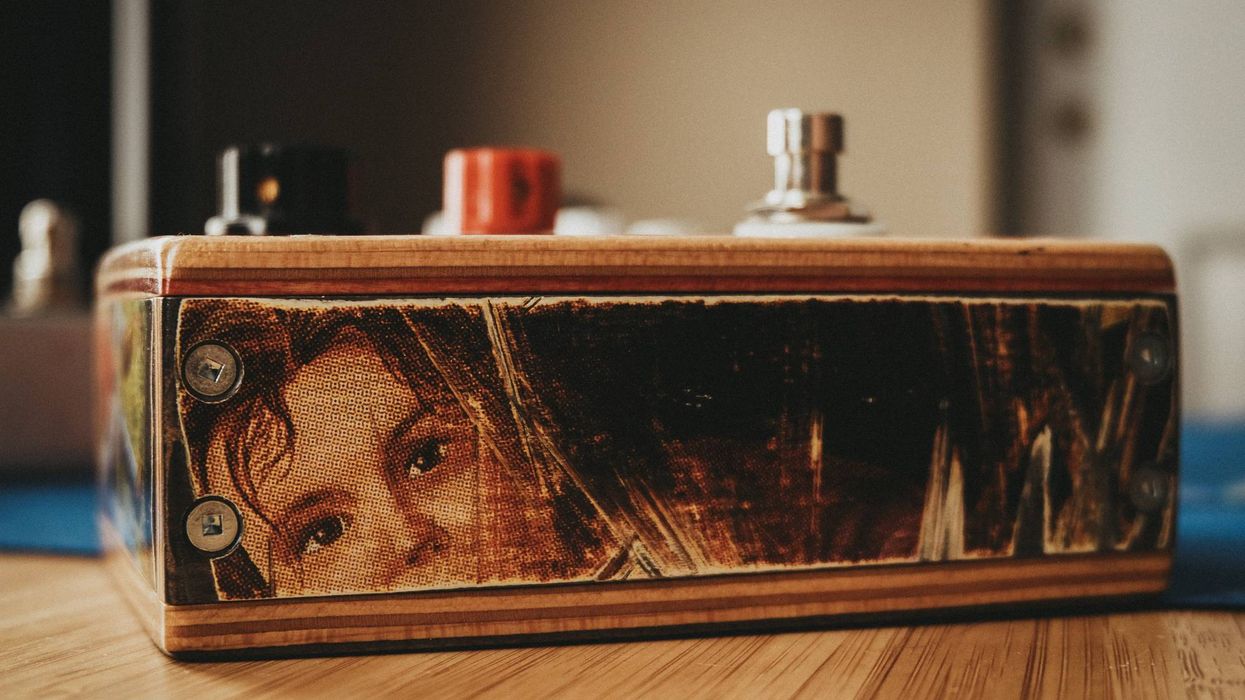If you’ve got adequate access to food, water, shelter, a decent education and/or job, and some expendable income, you’re someone we can safely say has “first-world problems”—challenges that are laughable compared to those faced by a significant portion of fellow earthlings. One of the biggest, dumbest “problems” we first-worlders face from day to day is how to not be bored by the banality of our fortuitous existence.
The more free time we get due to our serendipitous lack of survival crises, the more energy we dedicate to efforts to amuse ourselves. We scour the web for new tunes that’ll fire new neurons. We endlessly analyze old tunes. We read interviews and watch gear demos. We unpack dust-covered instruments to weigh whether to keep the thing or sell it to some similarly bored eBay hound. We save up or go into debt to add some long-lusted-after item or some seductively beckoning new piece of gear to our existing stockpile. All because we’re [yawn] B. O. R. E. D.
What’s interesting is how this tendency can lead to a consequential split in the pathway of an artist’s development. The problem isn’t necessarily that we do these things (unless we do them to the exclusion of other healthy, well-rounded, more social and selfless behaviors), it’s that often we do them without stopping to consider how they comport with our musical vision or goals. Because the reality is, if we’re not careful, the net effect of how we guitar and bass junkies relieve our boredom can actually lead us to create boring music.
Let me repeat that: The methods by which we inspire ourselves can pose a very real threat to our success as compelling musicians.
Let’s illustrate with two contrasting scenarios: Guitarist A has been playing for 20 years. He’s long been a Les Paul guy—a huge Zeppelin, Peter Green, and Gary Moore fan. One day he sees a pretty decent Craigslist deal for a Fender Jazzmaster. Over the years he’s seen lots of pics of surf-rock icons gripping this weird cousin of the Strat, and he figures why not branch out a little? So he emails the owner, they meet for the trade-off, and he spends the next three months learning every classic surf tune he can. “Misirlou,” “Apache,” Wipe Out,” you name it. Before long, though, he misses the raw power of a blasting Paul, and he heads back to his beloved Gibson and the classic-rock tunes of his formative years. A week or three passes before he sees a tempting auction for a Telecaster that’s almost as sweet-looking as the one he’s seen Keith Richards with in a zillion pics. Rinse and repeat.
to create boring music.
Guitarist B also has a lot of playing years under her belt, and grew up on a pretty meaty Les Paul diet: Zep, Guns N’ Roses, Sex Pistols. One day she sees a pretty decent deal for a Jaguar—a guitar she’s never really seen played by anyone she likes, but that nevertheless intrigues her. She thinks, What the hell—it’s time for a change. She dials up the owner, makes a deal, comes home with her new axe, plugs it in, and quickly finds that it sounds horrid with her LP-optimized rig. Undaunted, she reduces the gain and treble on her overdrive, adds a little more reverb than she’d normally use, and she begins to feel giddy. She suddenly remembers that old fuzz box that never sounded right with the Paul, decides to loop it into her board, and before she knows it, three hours have passed and she’s written two new songs that sound like her—but with a new twist. She’s ecstatic: A new chapter has begun.
These scenarios have much in common. Both guitarists were bored but adventurous. Both invested money, time, and effort in a worthy pursuit. The difference is that Guitarist A saw the new guitar as a tool to bend his will to. A concrete symbol of something that already exists—a means of achieving a preordained end. He will likely spend a lifetime chasing fleeting muses that temporarily amuse, but that inevitably leave him feeling empty. He has not discovered that, somewhere inside him, there’s a 6-string voice that could be as unique as his heroes’—if only he’d cure his boredom in pursuit of it instead of someone else’s sounds.
Guitarist B, on the other hand, saw the Jag as a tool to bend to her will, irrespective of how anyone else had used it. Guitarist B is hell-bent on developing her own voice. And yes, it’s inspired by others—as everyone’s is—but her efforts are focused inwardly. She will probably never make a nice side income as the ripping guitarist in a cover band that plays a couple hundred shows per year. Yet everywhere she plays, she will hear people comment on how fresh and unique she sounds. She will never lose the drive to discover the innermost depths of her musical self, and she’ll never regret her path.
So what’s it going to be for you—haphazard phases and flavor-of-the-month fetishization, or fearless commitment to being you, no matter the cost?












![Rig Rundown: Russian Circles’ Mike Sullivan [2025]](https://www.premierguitar.com/media-library/youtube.jpg?id=62303631&width=1245&height=700&quality=70&coordinates=0%2C0%2C0%2C0)





